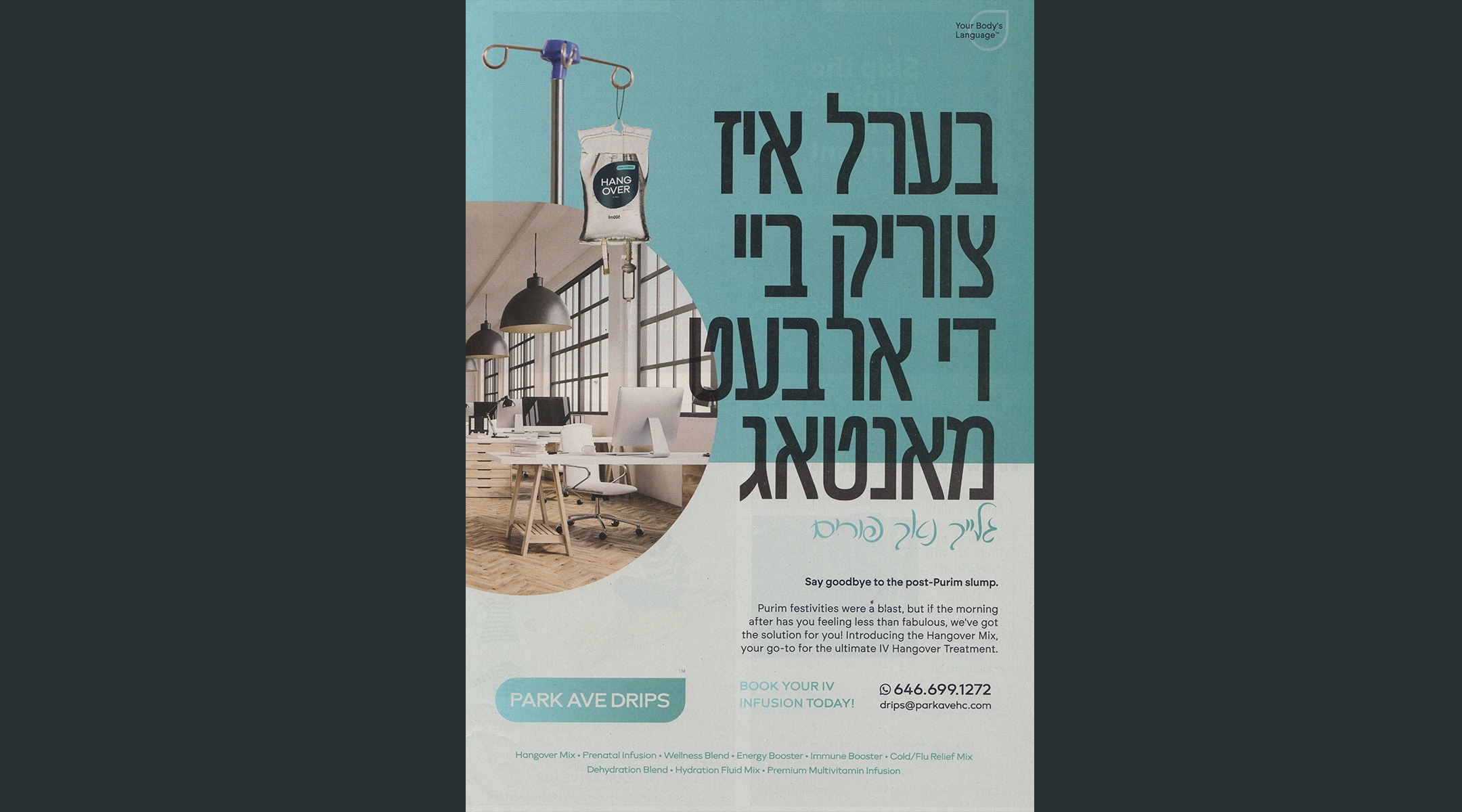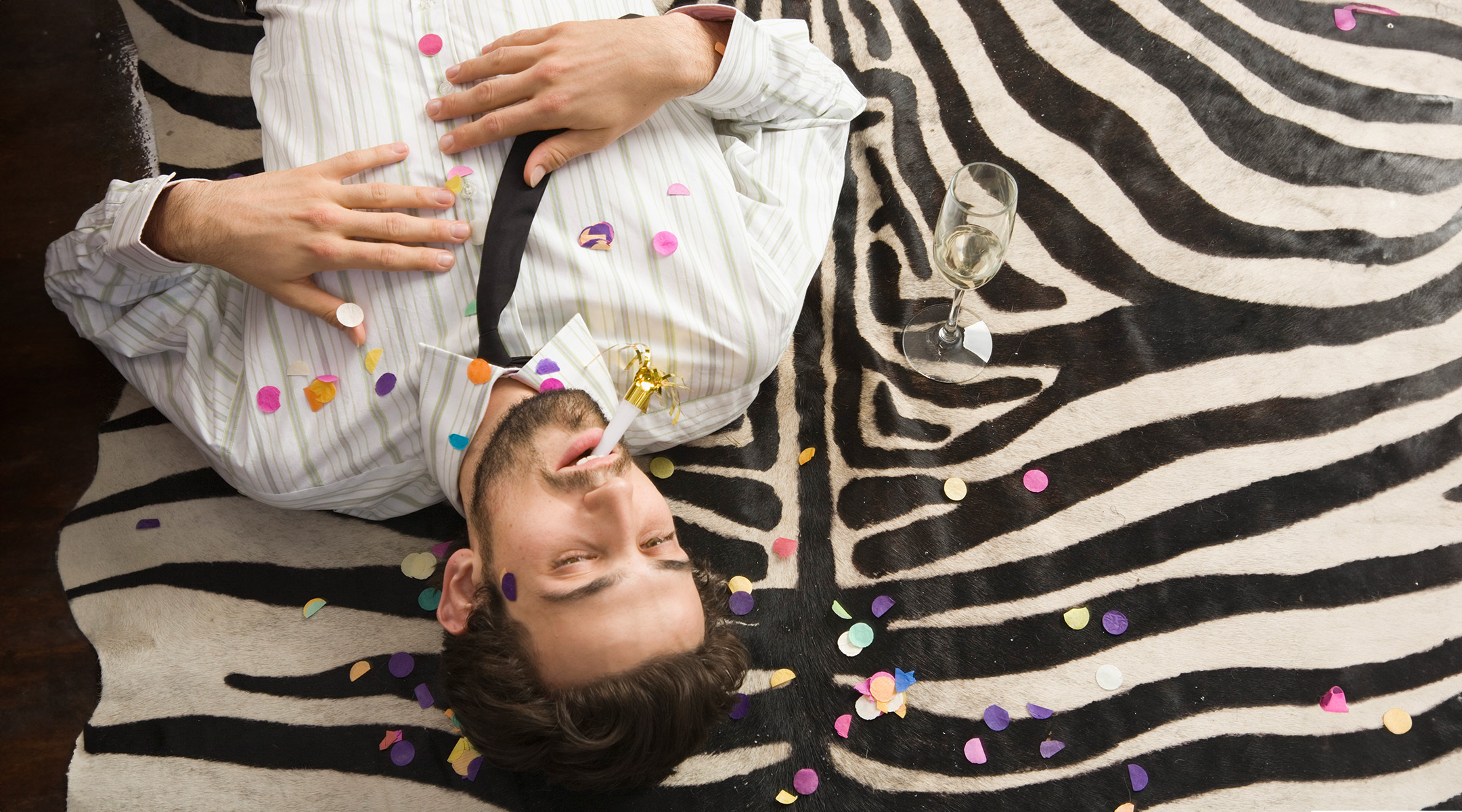(New York Jewish Week) — Flip through a recent issue of the Boro Park View, a glossy weekly targeting Brooklyn’s haredi community, and you’ll see advertisements for a $630 gefilte fish platter, condos in Rockland County and a new service that promises to help you “Say goodbye to the Post-Purim slump” — in other words, a hangover.
To alleviate the negative effects of drinking to excess on the carnival-like holiday, Park Ave Drips, a new division of a Brooklyn company called Park Avenue Home Care, will send a registered nurse to your home or workplace to intravenously administer what it describes as a “hangover mix.”
In the magazine advertisement, a photo of an IV bag labeled HANG OVER dangles over a row of workstations in an office. A Yiddish text reads: “Berl is back to work Monday right after Purim.” Of course, Berl is going to have to shell out quite a few shekels for his hangover mitigation: The price tag for this intravenous hangover “cure” is $499.
Purim, a joyful holiday that commemorates the thwarting of a planned massacre of Jews in ancient Persia, begins at sundown on Saturday, March 23 and lasts until sundown on Sunday, March 24. It is celebrated with costumes, feasting, the giving of gifts and the public reading of the Purim story — known as the megillah, or Book of Esther. The Talmud also suggests that one is obligated to drink so much that you become incapable of knowing whether you’re cursing the villain Haman or blessing the hero Mordecai — an injunction many revelers take seriously.
As a result, Purim is the latest Jewish holiday to become associated with pricey IV treatments. IV therapy to help ease the effects of fasting on Yom Kippur have become de rigueur in some circles. The rise of non-medical IV treatments among Jews mirrors a wider trend in so-called “wellness” culture, in which online influencers and celebrities like Kendall Jenner and Hailey Bieber have promoted IV vitamin drips.
IV treatments for hangovers have become popular in general culture, too; last year, the New York Times reported on the phenomenon, calling it “a cocktail after cocktails” and “a flush, for the flush” — while also noting the efficacy may be dubious. (“It’s like taking an Uber Black versus a shared Uber,” Dr. Ali Raja, the deputy chair of emergency medicine at Massachusetts General Hospital, told the paper. “It’ll get you to the same place, but maybe a lot more quickly.”)
This year, Park Ave Drips will offer at-home hangover infusions in four Orthodox Brooklyn neighborhoods: Williamsburg, Borough Park, Crown Heights and Flatbush, according to David Bernath, a partner in what he called a “proud Satmar business. “

A Yiddish-language advertisement for a “hangover mix” IV treatment from a division of a Brooklyn company called Park Avenue Home Care. (Boro Park View)
Bernath, 22, told New York Jewish Week that the hangover drips contain “premium fluids, vitamin B complex, vitamin B12 and Zofran.” Zofran is a prescription drug used to prevent nausea and vomiting after chemotherapy or radiation treatment.
According to Bernath’s business partner, Pinchus Blum, who is a paramedic and a member of the Williamsburg branch of the Jewish volunteer ambulance group Hatzolah, the prescriptions for Zofran are being written by a physician. He expects about 100 people to do the hangover IV drip after the holiday.
Some rabbis think that overdrinking on Purim has become a serious problem. Rabbi Dr. Aaron Glatt, the chair of medicine at Mount Sinai South Nassau hospital on Long Island and an associate rabbi at Young Israel of Woodmere in the Five Towns, said binge drinking is a medical and halachic (Jewish legal) no-no.
“Alcohol poisoning, acute intoxication can be extremely dangerous,” Glatt said. “So, a person shouldn’t say, ‘Well, there are treatments for it, so I’ll put myself into a dangerous situation.’”
Asked what he thought of IV treatments to cope with post-Purim hangovers, he responded, “I think that’s horrible — I don’t think that’s in the spirit of Purim,” he said. “It may be in k’neged halacha,” or a violation of traditional Jewish law.
IV treatments for immunity or energy have also become popular at Jewish weddings, said Bracha Banayan, the founder and CEO of IV Drips, a Brooklyn-based company. This may be a “wellness” thing for the bride and her mother, or to help alleviate symptoms of fasting, which some betrothed Jewish couples do before the ceremony on their wedding day.
“We’re at a lot of weddings,” Banayan said. “I had a very wealthy client who hired us to be there [at a wedding] for anyone who wanted it.”
Many medical professionals have criticized discretionary IV use, noting that its usage and efficacy has not been studied rigorously. “It’s the latest trend in functional or alternative medicine to kind of rip through the general community as a cure-all,” Dr. Joshua Septimus, a physician in Houston, told BuzzFeed News. “It’s just one more way to fleece people for money.”
Those who offer advice on hangovers — like the Cleveland Clinic — say there is no miracle cure. Instead they advise simple hydration, an electrolyte replacement like Gatorade or Pedialyte, an over-the-counter pain killer for headache and antacid for stomach upset, and perhaps a strong cup of coffee. To replenish vitamins after drinking, most recommend getting them from natural food sources.
Banayan’s IV Drips also offers hangover treatments, and she estimates that her company will end up doing 70 to 80 IV drips for Purim. Her business is active in six states, including New York and Louisiana, where business is brisk during Mardi Gras. St. Patrick’s Day is also a busy time for her company.

Mirroring a broader “wellness” trend, several Jewish influencers have endorsed the use of IV treatments, including in preparation for the Yom Kippur fast. (Screenshots via Instagram and YouTube. Design by Jackie Hajdenberg)
Banayan, a nurse practitioner, said every one of her clients speaks to one of the 15 nurse practitioners on staff before getting IV drips. Her company’s drips also contain the pain medication Toradol, which is similar to Advil.
“We’ll never write you a script without speaking to you,” Banayan said of IV Drips.
Having a physician oversee the IV drip operation may be legal but it could be dangerous if the doctor is not examining the patient, Glatt said. “There’s no medical evidence that this is of any benefit,” he added. “If you drink so much that you need IV therapy, then you shouldn’t be drinking.”
But Banayan said it is effective. “You can cure a hangover in 45 minutes,” she insisted. “It’s the most effective thing you can do to recover from a hangover. We’re able to help people feel better, get to shul.”
Gabriel Boxer, a 43-year-old Orthodox Jew on Long Island, is a true believer in IV treatments, which he first learned of on the television show “Billions.”
“I think it works,” said Boxer, who is known as The Kosher Guru on Instagram, where he has 62,000 followers. “I have done it for a hangover. I have done it for energy. I’ve had great results with it.”
Boxer, who admits to drinking heavily on Purim — “That’s part of the mitzvah,” he said — estimates he knows some 20 to 30 Jews ranging in age from their mid 20s to early 50s who do IV drips for Purim.
He counts himself among them.
“I know on Purim I’ll be celebrating, and I’m sure the next day I won’t be the same,” Boxer told the New York Jewish Week. “So, I already have scheduled an IV drip for the day after Purim at 10 a.m.”
The New York Jewish Week brings you the stories behind the headlines, keeping you connected to Jewish life in New York. Help sustain the reporting you trust by donating today.





